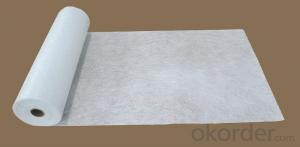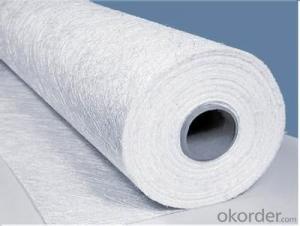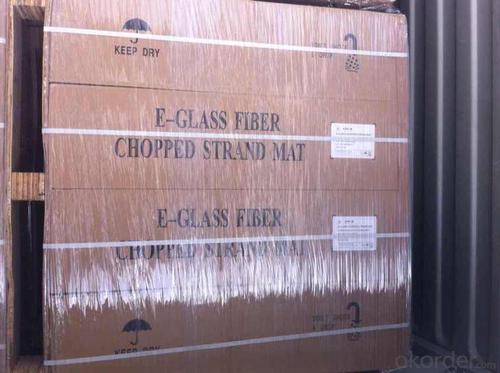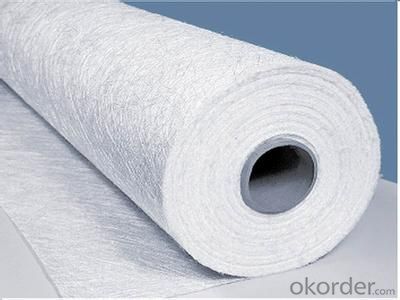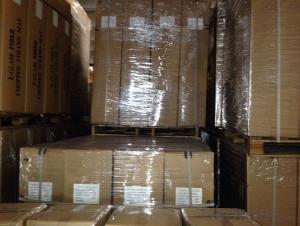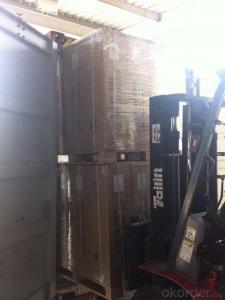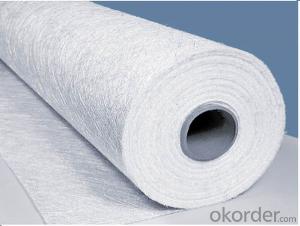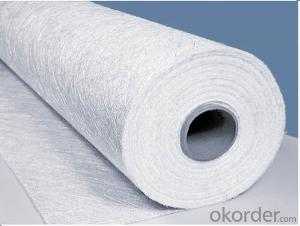Fiberglass Mat Tissue E Glass Fiber Chopped Strand Mat with Emulsion Binder Bonded
- Loading Port:
- Shanghai
- Payment Terms:
- TT OR LC
- Min Order Qty:
- 20000 kg
- Supply Capability:
- 200000 kg/month
OKorder Service Pledge
OKorder Financial Service
You Might Also Like
1.Brief Introduction
E-Glass Emulsion Chopped Strand Mat is made of randomly distributed chopped strands held tighter by a emulsion binder. It is compatible with UP, VE, EP resins.
It is compatible with UP, VE, EP, PF resins.
The roll width ranges from 50mm to 3300mm.
Additional demands on wet-out and decomposition time may be available upon request.
It is designed for use in hand lay-up, filament winding, compression molding and continuous laminating processes. Its end-use applications include boats, bath equipment, automotive parts, chemical corrosion resistant pipes, tanks, cooling towers and building components
2.Product Features
High tensile strength, allowing for use in hand lay-up process to produce large-area parts
Good wet-through and fast wet-out in resins, rapid air lease
Superior acid corrosion resistance
3.Product Specifications
Property | Area Weight | Moisture Content | Size Content | Breakage Strength | Width |
(%) | (%) | (%) | (N) | (mm) | |
Mathods | IS03374 | ISO3344 | ISO1887 | ISO3342 | |
EMC80E | ±7.5 | ≤0.20 | 8-12 | ≥40 | 50-3300 |
EMC100E | ≥40 | ||||
EMC120E | ≥50 | ||||
EMC150E | 4-8 | ≥50 | |||
EMC180E | ≥60 | ||||
EMC200E | ≥60 | ||||
EMC225E | ≥60 | ||||
EMC300E | 3-4 | ≥90 | |||
EMC450E | ≥120 | ||||
EMC600E | ≥150 | ||||
EMC900E | ≥200 |
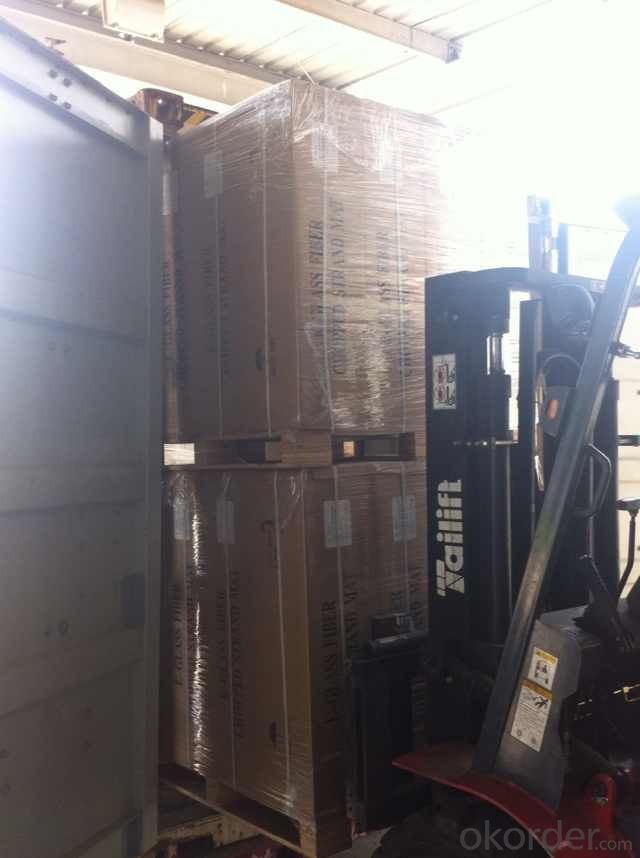 Packaging:
Packaging:
4.FAQ
Storage:
Unless otherwise specified, Chopped Strand Mat should be stored in a dry, cool and rain-proof area. It is recommended that the room temperature and humidity should be always maintained at 15℃~35℃ and 35%~65% respectively.
- Q: Can fiberglass mat tissue be used for insulation in underground pipelines?
- Yes, fiberglass mat tissue can be used for insulation in underground pipelines. It is a common material choice for insulating pipes due to its excellent thermal properties, durability, and resistance to moisture. The fiberglass mat tissue helps to reduce heat loss and prevent condensation, ensuring efficient and reliable insulation for underground pipelines.
- Q: Can fiberglass mat tissue be used for ceiling insulation?
- No, fiberglass mat tissue is not suitable for ceiling insulation. While fiberglass mat tissue is commonly used in various construction applications, such as reinforcing plaster or other building materials, it is not designed or recommended for insulation purposes. When it comes to ceiling insulation, there are specific materials that are more suitable and effective, such as fiberglass batts, cellulose, or foam insulation. These materials are specifically engineered to provide thermal resistance and reduce the transfer of heat between the interior and exterior of a building. Using fiberglass mat tissue as ceiling insulation would not only be ineffective in providing proper insulation, but it may also pose safety risks. Fiberglass mat tissue is typically thin and lacks the necessary thickness to effectively insulate ceilings. Additionally, fiberglass insulation materials are known to release airborne particles and fibers, which can be hazardous to health if inhaled. Therefore, it is important to use the appropriate insulation materials that are specifically designed for ceiling insulation to ensure energy efficiency, comfort, and safety in your home or building.
- Q: Is fiberglass mat tissue suitable for insulation in high-rise buildings?
- Yes, fiberglass mat tissue is suitable for insulation in high-rise buildings. Fiberglass mat tissue is a widely used insulation material that offers excellent thermal and acoustic properties. It is lightweight, flexible, and easy to install, making it ideal for use in high-rise buildings where efficiency and effectiveness are crucial. Fiberglass mat tissue also has excellent fire-resistant properties, which is an essential requirement for buildings with multiple floors. Additionally, it is resistant to moisture, mold, and pests, ensuring long-term durability and performance. The material can be easily customized to fit various areas of the building, including walls, floors, and ceilings, providing consistent insulation throughout the structure. Overall, fiberglass mat tissue is a reliable and cost-effective insulation option for high-rise buildings.
- Q: What is the density of fiberglass mat tissue?
- The density of fiberglass mat tissue typically ranges from 0.3 to 0.6 grams per cubic centimeter (g/cm³).
- Q: How is fiberglass mat tissue used in the production of shower enclosures?
- Fiberglass mat tissue is commonly used in the production of shower enclosures due to its excellent properties and benefits. It is a thin and flexible material made up of fine glass fibers that are randomly distributed and bonded together with a resin binder. In the production process of shower enclosures, fiberglass mat tissue is primarily utilized as a reinforcement material. It is often applied to the surface of the enclosure structure to enhance its strength, durability, and resistance to cracking or breaking. Firstly, the fiberglass mat tissue is cut and sized to fit the specific dimensions of the shower enclosure. It is then carefully laid or applied onto the surface of the enclosure, usually through a process called hand lay-up or spray-up. The mat tissue is positioned strategically to cover all the critical areas that require reinforcement, such as corners, edges, and joints. Once the mat tissue is in place, a resin, typically polyester or epoxy, is applied over it. The resin infiltrates the fiberglass mat tissue and bonds with the fibers, creating a solid and robust composite structure. This resin-fiberglass combination provides additional strength and stability to the shower enclosure, making it more resistant to impact, stress, and environmental factors like water and humidity. Moreover, fiberglass mat tissue also contributes to the overall aesthetics of the shower enclosure. It can help create a smooth and uniform surface finish, eliminating imperfections and creating a visually appealing appearance. The mat tissue can be easily molded or shaped to match different designs and styles, enabling manufacturers to produce shower enclosures with various shapes, sizes, and patterns. In summary, fiberglass mat tissue plays a crucial role in the production of shower enclosures by providing reinforcement, strength, durability, and aesthetic benefits. It is a versatile material that enhances the overall performance and visual appeal of the enclosures, ensuring they can withstand daily use and maintain their quality over time.
- Q: What is the expected lifespan of fiberglass mat tissue in residential applications?
- The expected lifespan of fiberglass mat tissue in residential applications can vary depending on various factors such as the quality of the material, the installation process, and the environmental conditions it is exposed to. However, on average, fiberglass mat tissues are designed to have a lifespan of around 20 to 30 years. Fiberglass mat tissues are commonly used in residential applications for reinforcing and strengthening purposes, particularly in areas prone to moisture and water damage such as bathrooms, kitchens, and basements. They are known for their excellent resistance to mold, mildew, and rot, making them a popular choice in these areas. With proper installation and maintenance, fiberglass mat tissues can provide long-lasting support and protection to the underlying surfaces. However, it is important to note that they can be susceptible to damage if not handled or installed correctly. Any improper installation or exposure to extreme conditions such as excessive heat or direct sunlight can significantly reduce their lifespan. Regular inspection and maintenance of fiberglass mat tissues are essential to ensure their optimal performance and longevity. This may include checking for any signs of wear, tear, or water damage, and promptly addressing any issues that arise. Additionally, periodic cleaning and sealing can help prolong the lifespan of the material. In summary, while the expected lifespan of fiberglass mat tissue in residential applications is typically around 20 to 30 years, it is crucial to consider factors such as quality, installation, and maintenance to ensure its durability and longevity.
- Q: Can fiberglass mat tissue be used for roofing?
- Yes, fiberglass mat tissue can be used for roofing. It is commonly used as a reinforcement material for roofing systems due to its high strength and durability. It helps to enhance the structural integrity of the roof and improve its resistance to weathering and other external factors.
- Q: Can fiberglass mat tissue be used for insulation in pharmaceutical storage areas?
- No, fiberglass mat tissue is not suitable for insulation in pharmaceutical storage areas. This material may release particles or fibers that can contaminate the pharmaceutical products, which could compromise their quality and safety. It's essential to use insulation materials that are specifically designed and approved for pharmaceutical storage areas to ensure optimal conditions and adherence to regulatory standards.
- Q: Is fiberglass mat tissue resistant to mildew and rot?
- Indeed, the resistance of fiberglass mat tissue to mildew and rot is undeniable. Crafted from delicate glass fibers interlaced to form a robust and enduring substance, fiberglass stands as a paragon. Its non-porous nature prevents moisture absorption, thus endowing fiberglass mat tissue with exceptional resistance against mildew proliferation and rot-induced decomposition. Moreover, fiberglass often receives protective coatings or additives that amplify its fortitude against these biological detriments. For this reason, fiberglass mat tissue emerges as an exemplary selection in settings where humidity or moisture pose a threat, such as bathrooms, outdoor structures, or regions prone to elevated humidity levels.
- Q: Can fiberglass mat tissue be painted over?
- Indeed, fiberglass mat tissue can be painted on. Nevertheless, there are a few factors that necessitate consideration. Firstly, it is imperative to ensure the cleanliness and absence of any dirt, grease, or contaminants on the fiberglass mat tissue prior to painting. This can be accomplished by washing the surface with a gentle detergent and water, followed by thorough rinsing and drying. Secondly, it is advisable to apply a primer before painting in order to enhance adhesion and achieve a smoother finish. It is recommended to utilize a high-quality primer specifically formulated for fiberglass surfaces, adhering to the manufacturer's instructions for application. Lastly, when selecting the paint, it is crucial to choose one that is compatible with fiberglass materials. Acrylic or epoxy-based paints are often suggested as they exhibit good adhesion and durability on fiberglass surfaces. By adhering to these steps and employing appropriate materials, it is feasible to successfully paint over fiberglass mat tissue. Nevertheless, it is always prudent to seek advice from a professional or follow the manufacturer's recommendations for optimal outcomes.
Send your message to us
Fiberglass Mat Tissue E Glass Fiber Chopped Strand Mat with Emulsion Binder Bonded
- Loading Port:
- Shanghai
- Payment Terms:
- TT OR LC
- Min Order Qty:
- 20000 kg
- Supply Capability:
- 200000 kg/month
OKorder Service Pledge
OKorder Financial Service
Similar products
Hot products
Hot Searches
Related keywords

